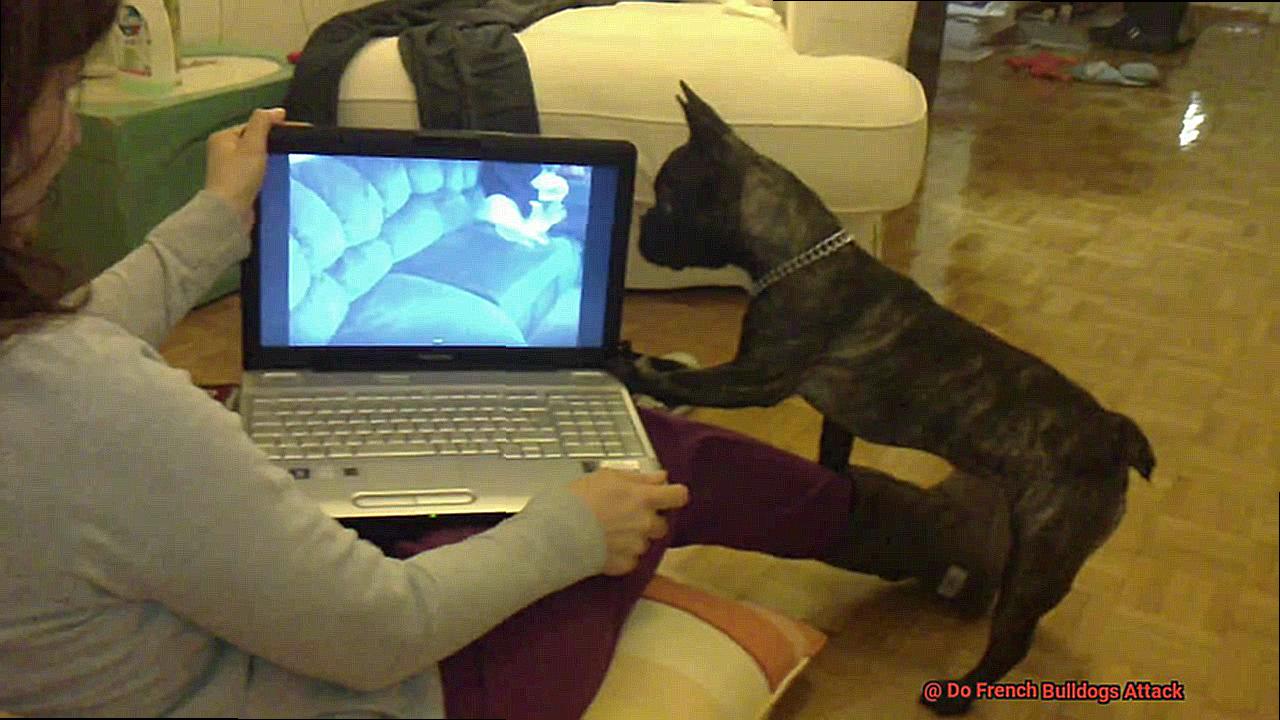Do French Bulldogs Attack?
In the realm of four-legged companions, French Bulldogs have emerged as the darlings of dog lovers worldwide. With their unmistakable charm and endearing appearance, these pint-sized pooches have stolen countless hearts. But amidst their popularity, a lingering question persists: do French Bulldogs possess an innate propensity for aggression? In this blog post, we embark on a quest to unravel this enigma, separating fact from fiction. Whether you’re contemplating inviting a French Bulldog into your abode or merely intrigued by their temperament, it’s crucial to grasp the reality behind their behavior. So join us as we debunk the myths and unearth the truth about French Bulldogs and their potential for aggression.
Do French Bulldogs attack
Contents
- 1 Do French Bulldogs attack
- 2 The Temperament of French Bulldogs
- 3 Causes of Aggression in French Bulldogs
- 4 Signs of Aggression in French Bulldogs
- 5 Reducing the Risk of Aggression in French Bulldogs
- 6 Training Tips for Managing Aggressive Behavior in French Bulldogs
- 7 Health Issues that May Lead to Aggression in French Bulldogs
- 7.1 Pain: The Silent Aggressor
- 7.2 Hormonal Imbalances: Culprits Behind Uncharacteristic Aggression Hypothyroidism and Cushing’s disease can affect behavior and temperament. Lethargy, anxiety, and aggression may be symptoms of hormonal imbalances. Consult with a veterinarian to explore possible hormonal issues. Neurological Disorders: The Brain’s Influence on Behavior
- 7.3 Medications: A Double-Edged Sword
- 8 Consulting a Professional Trainer or Behaviorist for Help With Aggressive Behavior in French Bulldogs
- 9 Conclusion
French Bulldogs, known for their friendly and affectionate nature, are not typically aggressive dogs. However, like any breed, they may display aggression if not properly trained, socialized, or when feeling threatened. In this article, we will discuss why French Bulldogs may exhibit aggressive behavior and provide practical measures owners can take to prevent it.
Understanding Aggression in French Bulldogs:
Genetics and Upbringing:
The temperament of a French Bulldog is influenced by genetics and upbringing. Responsible breeding practices and early socialization play a vital role in shaping their behavior.
Signs of Aggression:
Recognizing the signs of aggression is crucial. Watch out for raised hackles, stiff posture, intense staring, or showing teeth. Addressing these signs early can prevent escalation.
Preventing Aggressive Behavior:
Training and Socialization:
Proper training and socialization from an early age are key to preventing aggression. Expose your French Bulldog to various environments, people, animals, and experiences to build confidence.
Positive Reinforcement:
Reward-based training methods using treats, praise, and playtime can help reinforce positive behavior and discourage aggression.
Professional Help:
If your French Bulldog exhibits aggressive tendencies, consult a certified dog trainer or behaviorist. They can assess the underlying causes and provide appropriate training techniques.
Creating a Safe Environment:
A safe and positive environment reduces anxiety and frustration, minimizing the likelihood of aggression. Provide a calm space for your French Bulldog when needed.
The Temperament of French Bulldogs
French Bulldogs are known for their friendly and affectionate nature, making them a popular choice for many pet owners. Their pleasant temperament is one of their most endearing qualities, but it is important for owners to understand that proper training, socialization, and a safe environment are crucial in ensuring a well-adjusted and happy French Bulldog.
Breeding History:
French Bulldogs were originally bred as companion dogs, specifically to be loving and affectionate towards their owners. This purposeful breeding has resulted in a breed that is naturally inclined to be friendly and loyal. It is important to note that every dog is an individual, but in general, French Bulldogs have a gentle and sociable disposition.
Great with Children:
French Bulldogs are known to be excellent family pets, as they are patient and tolerant with children. However, it is essential to teach children how to interact with dogs properly and supervise their interactions to prevent any potential issues.
Potential for Aggression:
While French Bulldogs are not prone to unprovoked attacks or aggression, they may exhibit aggressive behavior if they feel threatened or perceive a danger to themselves or their owners. This can be avoided through proper socialization and training from a young age.
Territorial Behavior:
French Bulldogs can be quite territorial, especially when it comes to their owners or their favorite spots in the house. They may display protective behavior if they feel someone is encroaching on their territory or if they sense a potential threat. This is usually limited to barking or growling as a warning rather than physical aggression.
Causes of Aggression in French Bulldogs
French Bulldogs, those adorable little bundles of joy with their expressive eyes and smushy faces, are known for their friendly and affectionate nature. But what happens when that sweet demeanor takes a turn for the aggressive? In this blog post, we’re going to dig deep and explore the causes of aggression in French Bulldogs. Buckle up, because we’re about to unleash the truth.
- Genetic Factors: Just like us humans, French Bulldogs can inherit certain traits from their parents. Some lines or breeds may have a higher propensity for aggression due to specific genes that affect their temperament. It’s important for breeders to carefully select breeding pairs to minimize the risk of passing on aggressive traits.
- Lack of Socialization: Picture this – a French Bulldog who hasn’t been properly socialized from a young age. They might be fearful or anxious around unfamiliar people or animals, leading to aggressive behaviors as a defense mechanism. That’s why socialization is key. Exposing your Frenchie to different environments, people, and animals helps them become comfortable and confident in various situations.
- Fear and Anxiety: We all know that feeling – the heart racing, palms sweating, and the urge to flee. Well, dogs experience fear and anxiety too. If a French Bulldog feels threatened or insecure, they may resort to aggression as a means of protection. Identifying triggers and working on desensitization and counter-conditioning techniques can help alleviate these emotions.
- Possessiveness: French Bulldogs might have a reputation for being possessive little gremlins when it comes to guarding their resources – food, toys, or even their beloved owners. This possessive behavior can stem from a lack of training or inconsistent boundaries set by the owner. Establish yourself as the pack leader and implement consistent rules and boundaries to prevent possessive aggression.
- Pain or Medical Conditions: Picture this – you stub your toe, and suddenly you’re ready to bite someone’s head off. Well, dogs are no different. If a French Bulldog is in pain or suffering from an underlying medical condition, they may lash out. Monitoring their health and seeking veterinary attention when needed is crucial to prevent aggression caused by discomfort.
- Lack of Training and Discipline: We all know that saying – “When you give a dog an inch, they’ll take a mile.” Without proper training and discipline, French Bulldogs can become confused and frustrated, leading to aggression. Obedience training, positive reinforcement, and clear boundaries are essential in ensuring your Frenchie understands acceptable behavior.
- Traumatic Experiences: Sometimes, life throws us a curveball, and our furry friends are no exception. Dogs that have experienced abuse, neglect, or other traumatic events may display aggression as a result of their past experiences. Providing a safe and nurturing environment is crucial for healing and seeking professional help if necessary.
Signs of Aggression in French Bulldogs
French Bulldogs are generally known for their friendly and affectionate nature. However, like any other breed, they can display signs of aggression under certain circumstances. It is important for French Bulldog owners to be aware of these signs to ensure the safety of both their pet and those around them. So, let’s dive into the signs of aggression in French Bulldogs.
- Growling and Snapping: One of the most common signs of aggression in French Bulldogs is growling and snapping. If a French Bulldog feels threatened or uncomfortable, they may exhibit these behaviors as a warning. It is important not to ignore these signs and take appropriate action to remove the dog from the situation.
- Biting: In extreme cases, French Bulldogs may resort to biting when they feel extremely threatened or fearful. This can happen if they are cornered or provoked beyond their tolerance levels. It is crucial for owners to understand their dog’s boundaries and avoid situations that may trigger such aggressive behavior.
- Stiff Body Language: A stiff body posture is another indication of potential aggression in French Bulldogs. When a French Bulldog becomes rigid and tense, it signifies that they are on high alert and ready to defend themselves if necessary. This should be taken as a warning sign and handled with caution.
- Raised Hackles: Raised hackles, which are the hair along the back of a dog’s neck and spine, can also indicate aggression in French Bulldogs. When a French Bulldog’s hackles are raised, it suggests that they are experiencing heightened arousal or agitation. This can be a precursor to aggressive behavior and should not be ignored.
- Lunging or Charging: If a French Bulldog lunges or charges towards someone or another animal, it is a clear sign of aggression. This behavior is often triggered by fear or territorial instincts. It is essential to address this behavior promptly through training and socialization to prevent any potential harm.
- Resource Guarding: French Bulldogs, like many other dogs, may exhibit aggression when it comes to protecting their resources. This could include food, toys, or even their favorite spot on the couch. Resource guarding can manifest as growling, snapping, or even biting if someone tries to approach or take away the guarded item. Proper training and management techniques can help minimize this behavior.
- Body Posturing: Aggressive body posturing in French Bulldogs may involve standing tall, stiffening their body, and displaying a direct stare. These postures indicate dominance and a potential readiness to engage in aggressive behavior. Owners should be vigilant and intervene appropriately to prevent any escalation.
Reducing the Risk of Aggression in French Bulldogs
French Bulldogs are generally known for their friendly and affectionate nature. However, like any dog breed, they can exhibit aggressive behavior under certain circumstances. While aggression in French Bulldogs is not common compared to some other breeds, it is still important to take steps to prevent it. In this section, we will explore how proper socialization, training, setting rules and boundaries, providing mental and physical stimulation, neutering or spaying, and building a strong bond with your pet can help reduce the risk of aggression in French Bulldogs.
Proper Socialization:
Proper socialization from a young age is crucial for French Bulldogs. Exposing them to various people, animals, and environments helps them feel comfortable and confident in different situations. This can be done through puppy playdates, obedience classes, and supervised interactions with other dogs and animals.
Training and Obedience:
Training and obedience classes are essential in preventing aggression. Teaching basic commands and providing consistent discipline helps establish boundaries and reinforces positive behavior. Positive reinforcement techniques should be used to reward good behavior and discourage aggressive tendencies.
Setting Rules and Boundaries:
It is crucial to set clear rules and boundaries for your French Bulldog. Consistency is key, as inconsistency can lead to confusion and potentially increase the risk of aggressive behavior. All family members should be on the same page when it comes to enforcing rules.
Providing Mental and Physical Stimulation:
French Bulldogs need both mental and physical stimulation to prevent boredom-related aggression. Regular exercise, interactive toys, and puzzle games can help redirect their energy in a positive way. Engaging their minds with training exercises or scent games can also keep them mentally stimulated.
Neutering or Spaying:
Neutering or spaying your French Bulldog can help reduce the risk of aggression. Studies have shown that intact dogs are more likely to display aggressive behaviors compared to those that have been sterilized. Consult with your veterinarian to determine the best age for this procedure.

Building a Strong Bond:
Building a strong bond with your French Bulldog is crucial in preventing aggression. Spend quality time together, engage in positive reinforcement training, and provide plenty of love and attention. A strong bond will help establish trust and communication between you and your pet.
Remember, if you notice any signs of aggression in your French Bulldog, it is important to address the issue promptly. Seeking professional help from a qualified dog trainer or behaviorist can provide valuable guidance and support in managing and modifying aggressive behaviors.
Training Tips for Managing Aggressive Behavior in French Bulldogs
French Bulldogs are known for their friendly and playful nature, but just like any other dog breed, they can sometimes display aggressive behavior. It’s crucial for French Bulldog owners to be aware of this potential aggression and take proactive measures to manage and train their dogs effectively. In this article, we will explore some valuable tips for training and socializing French Bulldogs to prevent and address aggressive behavior.
Early Socialization:
Socializing your French Bulldog from a young age is key to preventing aggressive behavior. Introduce them to different people, animals, and environments to help them develop positive associations and reduce the likelihood of fear or aggression later in life. Take them to puppy classes, organize playdates with other friendly dogs, and expose them to various sounds, sights, and smells. This will help your furry friend become confident and well-adjusted.
Positive Reinforcement Training:
French Bulldogs respond well to positive reinforcement training methods. Use treats, praise, and play as rewards for good behavior. Rewarding desirable behaviors encourages your dog to repeat them while discouraging aggressive tendencies. For example, when your French Bulldog greets someone calmly instead of jumping up, reward them with a treat or a pat on the head.
Consistent Rules and Boundaries:
Establishing consistent rules and boundaries helps your French Bulldog understand what is expected of them. This clarity prevents confusion and frustration, reducing the likelihood of aggression. For instance, if your French Bulldog growls when you try to take away their food bowl, establish a rule that they must wait patiently before eating, rewarding them when they comply.

Avoid Punishment-based Training:
Punishment-based training methods can escalate aggression in French Bulldogs. Instead of using physical corrections or harsh reprimands, focus on positive reinforcement techniques that reward wanted behaviors and redirect unwanted behaviors without punishment. This builds trust and strengthens the bond between you and your furry companion.
Desensitization and Counterconditioning:
If your French Bulldog shows aggression towards specific triggers, such as other dogs or strangers, desensitization and counterconditioning techniques can be effective. Gradually expose them to the trigger in a controlled environment while providing positive experiences and rewards to change their emotional response. For example, if your French Bulldog becomes aggressive when meeting new dogs, start by introducing them to calm and friendly dogs one at a time.
Health Issues that May Lead to Aggression in French Bulldogs
French Bulldogs are adored for their friendly and affectionate nature, but even the sweetest pooch can display aggression under certain circumstances. As responsible owners, it is essential to recognize that aggression in dogs can stem from underlying health issues. In this article, we will delve into the world of French Bulldog health problems that may contribute to aggression, shedding light on pain, hormonal imbalances, neurological disorders, and medications as potential culprits.
Pain: The Silent Aggressor
- Hip dysplasia and intervertebral disc disease can cause chronic pain.
- Pain-induced frustration may trigger aggression.
- Monitor signs of discomfort and seek veterinary care promptly.




